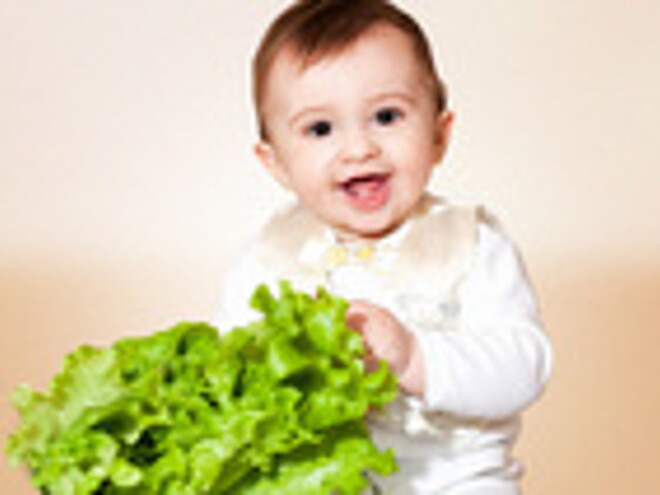
What are the essential nutrients your child needs? What are their sources?
Food provides your child's body with calories, which in turn provide him with energy. Your child's body needs this energy in order to perform its natural functions like breathing, food digestion and daily energy. The body's daily energy needs vary according to age, gender, sex, weight, height and the rate of physical movement. Overall, your child of 1-3 years of age needs 1000-1200 calories.
Here are some of the key nutrients that play an important role in your child's development:
Carbohydrates: Carbohydrates consist of short or long chains of sugars and play an important role in the dietary system. Carbohydrates are considered the primary source of energy for the body.
The most important sources of carbohydrates are:
The group of starches and grains like bread, cereals, rice, pasta, beans, oats, and infant cereals
The group of fresh fruits and juices
The group of starchy vegetables like carrots and sweet potatoes
The group of milk and its derivatives like sour milk and cheese
The child's diet must mostly contain slow absorption carbohydrates like whole grains which include oat and infant cereals, because it provides a steady level of blood sugar and consequently becomes a constant and slow source of energy.
Dietary fibers: These are a group of carbohydrates that are not digestible. Fibers help in maintaining regular movement of the intestines through the water absorption that softens them. They slow down the stomach emptying process, helping them feel satisfied for a longer period. These fibers are present in
Foods made from whole wheat like bread and wheat infant cereals
Fruits and vegetables
Legumes like lentil, beans and chickpeas
Proteins: Protein is an essential ingredient for the growth and repair of cells and the provision of energy. Although the growth of your child's height is related to genetic factors, keeping the right amount of protein within their diet is essential to ensure their comprehensive growth and development. Another essential point that needs to be taken into account in a child's nutrition is to diversify the sources of protein - it should include animal and vegetable proteins.
Its most important sources:
• Meat and legumes such as poultry, fish, lentil, beans and chickpeas
• Milk and its derivatives like sour milk and cheese
Fats: They are essential nutrients used by the body to carry out its functions, such as the protection of organs and storing of energy, and to provide it with vitamins soluble in fat (A, D, E, K).
Fat sources include:
• Biscuits and sweets
• Avocado oils such as olive oil and canola
Essential fatty acids: Essential fatty acids are the types of fat that are necessary for the body to perform its functions properly, and for healthy growth and development. The body does not manufacture them. So they should be obtained through nutrition. There are two kinds of such acids - linoleic acid (omega-6) and alpha-linolenic acid (omega-3). Rich sources of linoleic acid are vegetable oils, while the rich sources of alpha-linolenic acid include canola oil and salmon fish.
The daily dosage recommended to consume in each food group is as follows:
Starches and grains group:
• For 1 year of age: 2 servings
• From 2 to 3 years: 3 servings
One serving is equivalent to one piece of bread or half a cup of pasta or cooked rice.
The food pyramid recommends that half of the carbohydrates selected, at least, be from this group of whole grains such as whole wheat bread, pasta and brown rice, bulgur, oats and wheat flour cereals, due to its richness in vitamin B, iron and fibers.
Vegetables group:
• For 1 year of age: 1-2 servings
• From 2 to 3 years: 2-3 servings
One serving is equivalent to a cup of fresh vegetables or half a cup of cooked vegetables.
It gives your child fibers, vitamins and minerals. So it is recommended to eat it with every meal. The pyramid focuses on diversification within this group from all colors of spinach to tomatoes and carrots.
Fruit group:
• From 1 to 3 years: 2 servings
One serving is equivalent to a small-sized piece of fruit or half a cup of juice or sliced fruit.
If you want to give juice to your child, choose natural juice in moderation because it lacks the fibers contained in a whole natural fruit.
The group of milk and its derivatives:
• From 1 to 3 years: 2 servings
One serving is equivalent to a cup of milk or sour milk.
Meat and legumes group:
It is recommended to select low fat meat and also to diversify within this group.
• For 1 year of age: 1½ servings
• From 2 to 3 years: 2 servings
One serving is equivalent to 30g of meat or a quarter of a cup of legumes.
Healthy oils group:
• For 1 year of age: 3 servings
• From 2 to 3 years: 3 servings
One serving is equivalent to a teaspoon of healthy oils.
So if your child eats one kind from each of these groups in each of his three meals, he would meet his needs of essential nutrients.




















